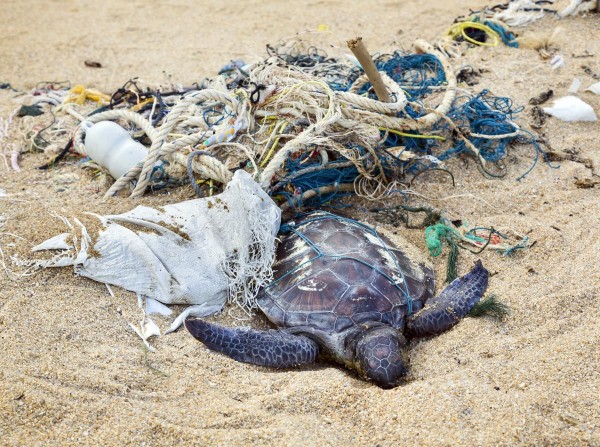Ocean of trash: An “island” of garbage is moving in on Thailand’s tourist resorts
02/16/2017 / By Daniel Barker

An enormous garbage “island” found floating in the Gulf of Thailand is now threatening to move ashore onto some of Thailand’s most popular beaches.
The garbage patch, which is roughly 10 kilometers long and weighs an estimated 100 tons, was recently discovered by a fishing trawler captain off the coast of Chumphon province. The floating trash was moving northward towards Koh Talu Island and the diving and resort areas of Prachuap Khiri Khan Province, where authorities fear a disruption of the tourist trade and significant damage to the environment.
Comprised mostly of plastic, the trash slick poses a threat to marine life such as dolphins and turtles who may eat floating bags they mistake for jellyfish, and to coral, which can be killed by plastic that sinks to the bottom.
The Royal Thai Navy and Marine and Coastal Resources Department have coordinated an effort to clean up the trash – an operation estimated to take 10 days – but the latest reports are that the cleanup has been halted due to unfavorable weather conditions.
Tides and wind had already spread the debris field and some of the trash had begun to wash up on local beaches before even stronger winds and waves were predicted for the area over the following days.
From the Bangkok Post:
“In the latest announcement, meteorologists warned of stronger winds and sea waves as high as two or three metres, said Department of Marine and Coastal Resources’ deputy director-general Sopon Thongdee.
“His department was cleaning up the rubbish off Prachuap Khiri Khan’s Bang Saphan and Bang Saphan Noi districts for a second day, and had removed only some from the sea, he said.”
Mr. Thongdee said that officials had found part of a plastic bag in the stomach of a dead sea turtle, and he warned that there is no time to waste in protecting the coastline’s marine life and coral reefs.
“It is necessary to remove the garbage from the sea as soon as possible,” he said.
Fortunately, no trash has yet been seen in the coral reef off Koh Thalu, according to Thongdee.
Plastic pollution is a problem that affects all of the world’s oceans. Billions of pounds of plastic are carelessly dumped into the sea every year, posing a serious threat to hundreds of wildlife species.
From the Center for Biological Diversity:
“Plastics pollution has a direct and deadly effect on wildlife. Thousands of seabirds and sea turtles, seals and other marine mammals are killed each year after ingesting plastic or getting entangled in it. Endangered wildlife like Hawaiian monk seals and Pacific loggerhead sea turtles are among nearly 300 species that eat and get caught in plastic litter.”
It’s estimated that the world’s oceans now contain as much as 50 trillion pieces of plastic – and plastic virtually never goes away.
The EPA says that “every bit of plastic ever made still exists,” and all that plastic creates a health risk for humans as well as animals.
The plastic garbage floating in the sea absorbs highly toxic pollutants such as DDT and PCBs, which are linked to cancer and other illnesses. The concentrations of these toxins found in plastic ocean debris can be up to a million times that of the surrounding seawater.
These toxins can make their way up the food chain when ingested by animals which are in turn eaten by humans. Other toxins such as BPA, which are already contained in plastics, can also end up in the food chain, posing a risk to humans.
One recent report predicted that by the year 2050, there will be more plastic than fish in the world’s oceans. By then, we’ll also be producing three times the amount of plastic that we are right now.
We still have time to stop things from turning out that way. Visit PlasticOceans.org or BiologicalDiversity.org to find out how you can make a difference.
Sources:
Tagged Under: environment, garbage island, marine life, plastic waste, Thailand


















